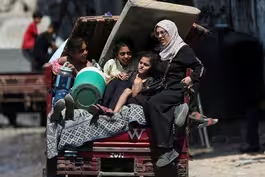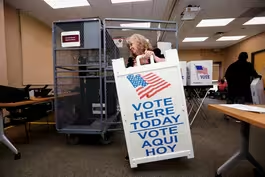
Scientists study effect of melting glaciers on volcanoes
Clip: 8/23/2025 | 6m 43sVideo has Closed Captions
As glaciers melt, scientists study potential for more violent volcanic eruptions
Scientists are flocking to Iceland to investigate an increasingly crucial question: Will melting glaciers accelerate and intensify earthquakes and volcanic eruptions? William Brangham reports.
Problems playing video? | Closed Captioning Feedback
Problems playing video? | Closed Captioning Feedback
Major corporate funding for the PBS News Hour is provided by BDO, BNSF, Consumer Cellular, American Cruise Lines, and Raymond James. Funding for the PBS NewsHour Weekend is provided by...

Scientists study effect of melting glaciers on volcanoes
Clip: 8/23/2025 | 6m 43sVideo has Closed Captions
Scientists are flocking to Iceland to investigate an increasingly crucial question: Will melting glaciers accelerate and intensify earthquakes and volcanic eruptions? William Brangham reports.
Problems playing video? | Closed Captioning Feedback
How to Watch PBS News Hour
PBS News Hour is available to stream on pbs.org and the free PBS App, available on iPhone, Apple TV, Android TV, Android smartphones, Amazon Fire TV, Amazon Fire Tablet, Roku, Samsung Smart TV, and Vizio.
Providing Support for PBS.org
Learn Moreabout PBS online sponsorshipJOHN YANG: In Hawaii, Kilauea is putting on a spectacular show spewing fresh lava 100 feet in the air.
The eruption, the 31st since December, is contained to the summit crater, so no homes are threatened.
Halfway around the world in Iceland, scientists are studying volcanoes to investigate an increasingly crucial question.
Will melting glaciers accelerate and intensify eruptions?
William Brangham explains.
WILLIAM BRANGHAM (voice-over): Getting to the volcanic crater called Vite, which comes from the Icelandic word for hell, involves a bumpy ride, an icy trek and a steep downward climb.
MICHELLE PARKS, Volcanologist, Icelandic Meteorological Office: The gas emissions alone can be very dangerous.
Here, you're taking a greater risk because you're actually in an old phreatic, explosive crater, and this is a site of active degassing.
WILLIAM BRANGHAM (voice-over): Michelle Parks is a volcanologist with the Icelandic Meteorological Office.
She and her colleagues regularly monitor this deep crater lake, which was created years ago by the volcano Askja.
Askja last erupted in 1961, but it started stirring again four years ago.
It's one of the most active and potentially dangerous volcanoes in Iceland.
Scientists flock here for research, and they're asking an increasingly crucial question.
As the glaciers that sit atop these volcanoes melt, which is driven in part by a warming planet, will that shrinking accelerate and intensify volcanic eruptions?
MICHELLE PARKS: I think it's very likely that we will see future changes.
But the question, of course, is when will this start happening and by how much will it affect volcanic activity?
WILLIAM BRANGHAM (voice-over): Parks takes acidity and temperature readings from the bubbling, steaming, sulfurous water of the crater lake.
A rise in either figure would indicate that more gases are pushing up from below, suggesting the volcano is moving closer to an eruption.
FREYSTEINN SIGMUNDSSON, University of Iceland: Askja is my favorite volcano in Iceland, as I've been coming here every year since 1990 to follow what the volcano is doing.
WILLIAM BRANGHAM (voice-over): Freysteinn Sigmundsson is a geophysicist at the University of Iceland.
Every year, he and his colleagues take precise measurements of the landscape, and they're finding that the land is shifting considerably.
FREYSTEINN SIGMUNDSSON: For my decades of studies here, the changes of the ground here have been on the centimeter scale.
But then suddenly, when the unrest began, we have had over 70 centimeters of uplift.
So that's a lot.
That's a big pressure increase.
WILLIAM BRANGHAM (voice-over): That building pressure indicates this volcano could erupt at any moment.
Scientists can't rule out that one day Askja could erupt with the same ferocity that Mount St. Helens did in 1980 in Washington State.
It was one of the most dramatic eruptions in recorded U.S. history.
Earlier this summer, Askja had 129 small earthquakes.
Only one was large enough for people to feel.
But those small quakes combined with changes in the terrain as well as what's happening with the glaciers, have researchers concerned about the future.
MICHELLE PARKS: So we're working on this large project investigating the effects of climate change and the ice retreat on future volcanic and seismic activity in Iceland.
WILLIAM BRANGHAM (voice-over): Iceland has long been known as a land of fire and ice.
Eons of volcanic eruptions shaped this wild and dramatic landscape.
But millions of tourists also come here to see the majestic beauty of its glaciers and ice formations up close, hopefully before they disappear.
At his summer home overlooking the Vaknajokel ice cap, Ragnar Frank Kristjansson has seen glaciers retreating with his own eyes.
RAGNAR FRANK KRISTJANSSON: Here and here.
In the first 15 years, it was a little bit forward, 10 meters backward.
Nothing big changes.
Within the last 10 years, it's going to be 100 meters each year as a 1 football field.
WILLIAM BRANGHAM (voice-over): He's been a glacier monitor for more than 25 years, tracking the retreat of two large nearby glaciers.
His daughter Iris has also seen the same changes over her lifetime.
IRIS RAGNA RSDOTTIR PEDERSEN: I've sometimes said to people like, it is like watching your friends disappear and having a very rough time.
And we look at the glaciers out of our, you know, kitchen window every day.
I think, like, of course, it's just devastating to see, like looking at photo albums and seeing, like, oh, my God.
You know, when I was growing up, the glaciers were so much bigger.
MICHELLE PARKS: I mean, Iceland is essentially one of the best places in the world to study this.
It's a natural laboratory because we have both volcanism and glaciers.
WILLIAM BRANGHAM (voice-over): Michelle Parks, along with other scientists, are testing to see if these shrinking glaciers could trigger more volcanic eruptions.
Ice still covers nearly half of Iceland's 34 active volcanic systems.
But as it melts, it lessens the downward pressure on the Earth's thin outer crust and much thicker underlying mantle that allows the Earth to rebound.
And that change in pressure spurs volcanoes to produce more magma, sending it in different directions and potentially creating new fractures underneath.
While it's too early to know for sure, there are potentially grave implications for the tens of millions of people who live near both glaciers and volcanoes around the world.
A 2020 study found 245 volcanoes within three miles of a glacier.
From the Andes to North America's Cascades to places like the Kamchatka Peninsula in Russia, where a massive 8.8 magnitude quake struck last month.
Six different volcanoes erupted nearby.
They'd been dormant since the 16th century.
The peninsula is also famous for its extensive glaciers.
Given the scale of the threat in Iceland, they're in a race to research their own risky future and potentially help warn others around the world who face a similar threat.
For PBS News Weekend, I'm William Brangham.
Aid worker on conditions in Gaza City after famine declared
Video has Closed Captions
Clip: 8/23/2025 | 5m 50s | ‘Purely in survival mode’: Aid worker shares conditions in Gaza City after famine declared (5m 50s)
Does Trump have the power to end mail-in voting?
Video has Closed Captions
Clip: 8/23/2025 | 6m 18s | Does Trump have the power to end mail-in voting? Legal scholar weighs in (6m 18s)
News Wrap: ICE seeks to deport Abrego Garcia to Uganda
Video has Closed Captions
Clip: 8/23/2025 | 4m 15s | News Wrap: ICE seeks to deport Kilmar Abrego Garcia to Uganda (4m 15s)
Providing Support for PBS.org
Learn Moreabout PBS online sponsorship
- News and Public Affairs

FRONTLINE is investigative journalism that questions, explains and changes our world.

- News and Public Affairs

Amanpour and Company features conversations with leaders and decision makers.












Support for PBS provided by:
Major corporate funding for the PBS News Hour is provided by BDO, BNSF, Consumer Cellular, American Cruise Lines, and Raymond James. Funding for the PBS NewsHour Weekend is provided by...


